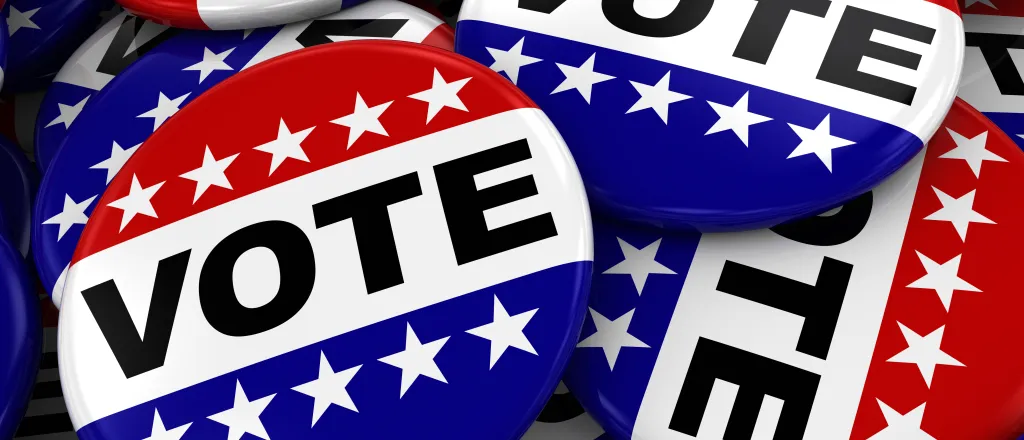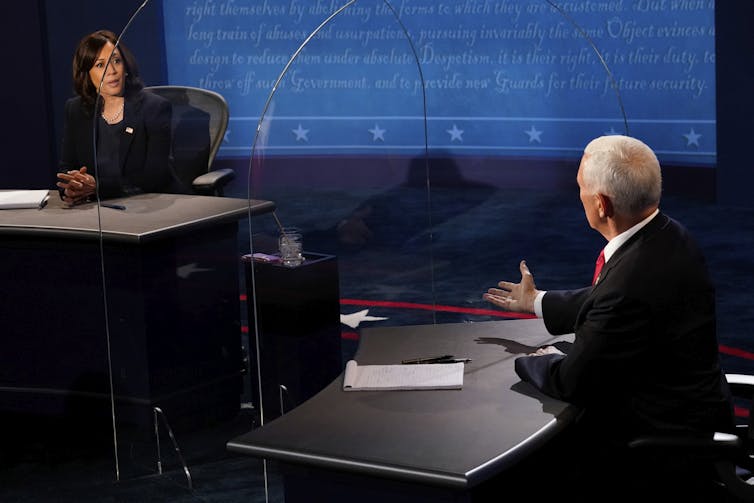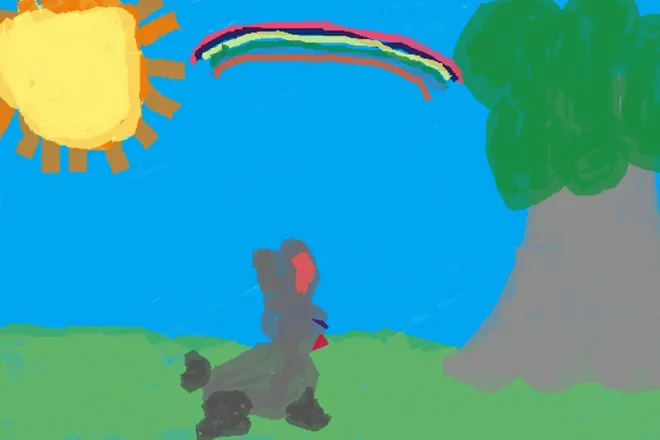
Harris and Pence dodge tough questions in VP debate – experts react
© iStock

Cynthia A. Young, Pennsylvania State University and Austin Sarat, Amherst College
Vice presidential candidates Kamala Harris and Mike Pence sat far apart and separated by Plexiglass for the only 2020 vice presidential debate, held in Utah on Oct. 7. Their exchanges were more civil than the presidential debate a week earlier, but Pence – and Harris to a lesser degree – avoided tough questions from USA Today’s Susan Page about the Supreme Court, COVID-19 response, succession and the peaceful transfer of power. Our experts were each assigned one candidate to watch and comment on.
Cynthia Young, Pennsylvania State University
On Harris
Harris needed to attack the Trump administration’s record and present herself as capable of stepping into Joe Biden’s shoes should the need arise. On those counts, I believe she acquitted herself well, attacking Trump and defending Biden in equal measure. Harris argued that Trump bungled the COVID-19 response, started and lost a trade war with China and destroyed U.S. relations with foreign leaders. She even managed to associate Pence with these failures, despite Pence’s four-year long battle to remain largely above the fray.
Though Harris was aggressive and smirked a bit too much, she was never uncivil or arrogant, effectively meeting Pence’s tendency to talk over her, interrupt her and exceed his allotted time with strong statements like “I’m talking,” which effectively shut Pence down.
When asked whether Biden intended to “pack the Supreme Court” by increasing the number of justices, Harris responded that the Trump administration had already packed the federal courts of appeals without appointing a single Black person. At another moment, she asserted that foreign policy was “about relationships,” suggesting to voters that the president often seems not to understand how to work with people, let alone other world leaders. Harris turned a question about health transparency into one on tax transparency, reminding voters that Trump paid as little as $750 in income tax in 2017.
Throughout, I felt Harris seemed warm, relatable and prepared, repeatedly reminding people that Biden had known personal tragedy and could empathize with the suffering of millions of displaced workers, whose jobs and loved ones had disappeared during this pandemic. She also appealed to “American Dream” mythology by asserting that she had broken several glass ceilings as a Black woman of South Asian descent. In a particularly memorable exchange, Harris critiqued a Kentucky grand jury‘s failure to bring charges against the police officers who killed Breonna Taylor. In response, Pence questioned her law and order credentials, but Harris quickly shot back, “I will not sit here and be lectured by the vice president about what it means to enforce the laws of our country,” because police officers know that “bad cops are bad for good cops.”
Though he largely held his own, Pence fell prey to bad luck when a fly landed on his head and remained there for about two minutes. Grist for endless memes and Twitter quips, the fly’s appearance and Pence’s unflinching response reinforced his reputation as robotic. The fly’s appearance was another unexpected development in an October that, for the Trump Administration, has been full of unwelcome surprises.
Austin Sarat, Amherst College
On Pence
The debate was something of a back-to-the-future event with both candidates drawing on a playbook made famous in the 1988 campaign.
Like that year’s Democratic presidential candidate, Michael Dukakis, who famously said that the campaign was about competence not ideology, Harris went after what she described as the Trump Administration’s incompetence, claiming its handling of the coronavirus pandemic was the “greatest failure of any presidential administration in American history.”
In response, Pence trumpeted the administration’s record, insisting several times against all the evidence that it was faithful to facts and science. Talking about climate change, he said, we are “following the science.” He called Harris “the most liberal senator in Congress” – a claim based on a 2019 GovTrack ranking of her voting record.
In so doing he borrowed a strategy of George H.W. Bush’s 1988 campaign and insisted that Biden and Harris represent just another, out-of-the-mainstream iteration of the Democrats tax, spend and regulate agenda. Pence repeated more than once Biden’s promise that he would repeal the Trump tax cuts. He said a Biden administration would enact the so-called Green New Deal – even though Biden doesn’t support it. And he claimed that Biden would upend American prosperity and surrender to China.
Like Bush’s use of the so called Willie Horton ad to discredit Dukakis, Pence told the story of the tragic death of Kayla Mueller, an American human rights activist and humanitarian worker who was taken captive in August 2013 in Syria and later killed by the Islamic State Group. He laid her death at the door step of the Obama-Biden Administration and claimed that she would be alive today if Donald Trump had been president when she was captured.
Throughout the evening, Pence presented a softer version of President Trump’s debate style, ignoring time limitations, talking over the moderator, interrupting Harris, and demanding she answer his questions. He exuded a calm confidence in the righteousness of the administration’s policies, offering Trump supporters reassurance that if one day he were to become president its agenda would remain intact.
[Deep knowledge, daily. Sign up for The Conversation’s newsletter.]![]()
Cynthia A. Young, Department Head and Associate Professor of African American Studies, Pennsylvania State University and Austin Sarat, Associate Provost and Associate Dean of the Faculty and Cromwell Professor of Jurisprudence and Political Science, Amherst College
This article is republished from The Conversation under a Creative Commons license. Read the original article.















